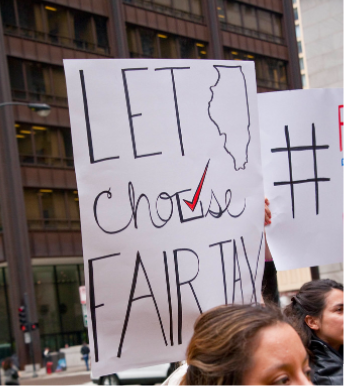
Photo: Flickr
We all know that voting this year is incredibly important – anyone who says otherwise is just ignorant. And while political candidates are all the rage to talk about these days, especially with the national debates, we also need to think about local issues in the state of Illinois.
As I drive around Bloomington, I see a lot of signs both for and against the Fair Tax proposal. I’m not yet sure which way I’m voting, but it’s important to stay informed on what the Fair Tax is and the benefits or drawbacks it provides.
Richard Guebert Jr., the president of the Illinois Farm Bureau, explains the Fair Tax proposal like this: “To cover all of Springfield’s spending and debt, the tax brackets and rates will have to be changed to raise taxes on the middle class and even the working poor.”
Essentially, this tax proposal is assigning tax percentages based on income brackets. If you’re making, say, $30k a year, you’ll get taxed X percent, and someone making $50k a year will get taxed Y percent. This isn’t the only graduated tax proposal in the country. Of the 43 states that do tax personal income, 32 states are on a graduated scale and 11 (including Illinois in its current state) use a flat tax.
From a liberal perspective, this seems like a great idea. We should be taxing those with more money. It puts less pressure on those who make less, and could (or rather, should) even out the scales a little more. The rich should not be continuing to get ahead and increase the wage gap; they should be contributing back to their communities and government by paying taxes that supposedly help better their surroundings.
Who knows if that is where tax money is really going, but in theory, it sounds nice. The more money you make, the more you should contribute to society. But at the same time, where does the incentive to make money go? Would you rather make less money and be taxed less, or make more money with a higher tax rate? I’m not sure if this tax proposal would necessarily incentivize people to continue to work harder and seek promotions if their tax rates would increase.
Governor J.B. Pritzker and Speaker of the House Mike Madigan are in support of this proposed plan, along with several other democrats and unions. According to the Chicago Sun Times, Madigan said, “Middle-class families bear too much of the burden under the current tax system, and a Fair Tax will enable us to make the wealthy pay their fair share to balance the budget and invest in critical resources like education and health care.”
Again, this sounds really great in theory. The question is, though, will it work? The tax proposal is also supported by the AARP, Planned Parenthood Illinois Action and the Illinois Education Association along with other teacher and educator-based organizations.
On the opposing side are mostly republicans and conservatives and their organizations. Americans for Tax Reform, the Illinois Farm Bureau, and the Illinois Chamber of Commerce have all spoken out against the proposal. However, some are just opposed to the plan, not necessarily tax reform itself. Steven Reick, a republican Illinois State Representative, was quoted in the Chicago Sun Times as saying “Do we need tax reform? You bet we do. This isn’t the way to do it. We need a global review of our entire tax system … with an operating system that tracks our economy, that doesn’t create class envy and class warfare and take money from those who are the most productive in our society.”
Both sides have compelling arguments, but ultimately it’s up to the voters. If you’re looking for more information, BallotPedia is an excellent resource and breaks down the proposal into the bare minimum that you need to know. No matter what side you choose, please vote. Every voice matters.
